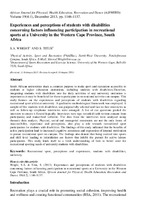| dc.contributor.author | Wright, S. A. | |
| dc.contributor.author | Titus, Simone | |
| dc.date.accessioned | 2017-06-10T08:57:15Z | |
| dc.date.available | 2017-06-10T08:57:15Z | |
| dc.date.issued | 2013 | |
| dc.identifier.citation | African Journal for Physical, Health Education, Recreation and Dance, 19(4:1): 1146-1157 | en_US |
| dc.identifier.citation | Wright, S. A. & Titus, S. (2013). African Journal for Physical, Health Education, Recreation and Dance, 19(4:1): 1146-1157 | |
| dc.identifier.issn | 1117-4315 | |
| dc.identifier.uri | http://hdl.handle.net/10566/2957 | |
| dc.identifier.uri | http://hdl.handle.net/10520/EJC145365 | |
| dc.description.abstract | South African universities share a common purpose to make sport and recreation accessible to students at higher education institutions, including students with disabilities.Therefore, integrating students with disabilities into the daily activities of any university institution is important as it may be beneficial for them to participate in recreational activities on campus. This study focuses on the experiences and perceptions of students with disabilities regarding recreational sport whilst at university. A qualitative methodological framework was employed. A sample of five students with disabilities was purposefully selected and face-to-face interviews as well as follow-up telephonic interviews were arranged. A list of cue questions guided the interview to ensure it flowed logically. Interviews were tape recorded (with written consent from participants) and transcribed verbatim. The data from the interviews were analysed using thematic data analysis. Physical, social and managerial constraints are not the only forms of inaccessibility, experience and perceptions, also play a role towards recreational sport participation for students with disabilities. The findings of this study indicated that the benefits of active participation lead to increased cognitive awareness and expression of internal motivation to pursue recreational sport on campus. The findings also denote that being coerced into sports and skill level leading to intimidation are factors that inhibit the pursuit for active leisure participation. This study lends itself to a fresh understanding of how to better cater for recreational sporting needs of university students with disabilities. | en_US |
| dc.language.iso | en | en_US |
| dc.publisher | LAM Publications Limited | en_US |
| dc.rights | Copyright LAM Publications Limited. Publisher granted permission for inclusion of the published file in the Repository. | |
| dc.subject | Recreational sport | en_US |
| dc.subject | Perceptions and experiences | en_US |
| dc.subject | Students with disabilities | en_US |
| dc.subject | University | en_US |
| dc.title | Experiences and perceptions of students with disabilities concerning factors influencing participation in recreational sport at a University in Western Cape Province , South Africa | en_US |
| dc.type | Article | en_US |
| dc.privacy.showsubmitter | FALSE | |
| dc.status.ispeerreviewed | TRUE | |
| dc.description.accreditation | Department of HE and Training approved list | |

